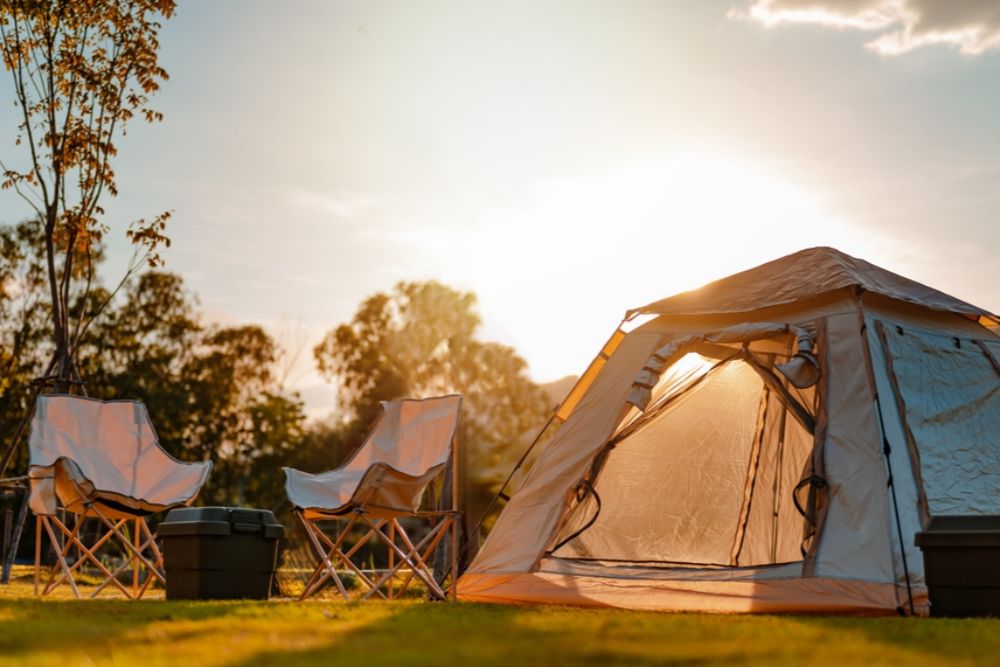Camping is one of the most affordable ways to explore the outdoors—but like any trip, the costs can add up if you’re not careful. Gear, food, transportation, campsite fees, and last-minute purchases can quickly turn a simple getaway into an expensive outing. The good news? With the right planning and smart decisions, you can enjoy a relaxing, memorable camping trip without stretching your budget.
A budget-friendly camping trip isn’t about cutting corners; it’s about making thoughtful choices that give you maximum enjoyment for minimal cost. From selecting the right campsite to packing efficiently and cooking creatively, every step offers opportunities to save money without sacrificing comfort or fun.
Here’s how to plan a budget-friendly camping trip from start to finish.
Choose an Affordable Destination and Campsite
Your choice of location has the biggest impact on your total cost. Some campgrounds charge premium fees, while others—especially state parks—offer beautiful spaces at budget prices.
Look for:
-
State parks with low nightly fees
-
National forests that offer very inexpensive or sometimes free dispersed camping
-
Campgrounds with basic amenities instead of full hookups
-
Sites close to home to reduce fuel expenses
-
Off-season dates, which can significantly lower fees
If you’re new to camping, start with a campground that offers basic amenities like water access and restrooms. It keeps the experience enjoyable without costly add-ons.
Set a Clear Budget Before You Start Planning
Camping feels inexpensive, but the small expenses add up quickly. Create a simple budget that includes:
-
Campsite fees
-
Gas and transportation
-
Food
-
Gear
-
Firewood
-
Optional activities
Once you see the numbers, you can adjust your plans—maybe choosing a closer destination or planning simple meals. A clear budget keeps your trip enjoyable and stress-free.
Borrow, Rent, or Repurpose Gear Instead of Buying New
Camping gear is one of the biggest expenses for beginners. But you don’t need the newest, most advanced equipment to enjoy nature.
Save money by:
-
Borrowing gear from friends or family
-
Renting tents and sleeping bags from outdoor stores
-
Checking local buy-and-sell groups for gently used items
-
Repurposing items you already own, like blankets, reusable water bottles, and kitchen tools
Focus on the essentials: a weather-appropriate tent, sleeping bag, light source, basic cookware, and proper clothing. Don’t buy specialized gear unless you know you’ll use it often.
Pack Efficiently to Avoid Last-Minute Purchases
Nothing blows a budget faster than buying overpriced items at campsite stores. Creating a detailed packing list ensures you bring everything you need the first time.
Make sure to pack:
-
Clothing layers based on the weather
-
A first aid kit
-
Cooking tools and utensils
-
Snacks and meal ingredients
-
Sunscreen, toiletries, insect repellent
-
Flashlights or headlamps
-
Sleeping gear and extra blankets
Packing efficiently saves money and keeps the trip comfortable.
Plan Simple, Budget-Friendly Meals
Food is usually one of the biggest expenses on trips, but camping offers a perfect opportunity to simplify. Instead of buying pre-packaged meals or eating at restaurants near the campsite, prepare affordable meals that store well and require minimal equipment.
Budget-friendly camping meals include:
-
Sandwich ingredients
-
Rice and beans
-
Pasta and jarred sauce
-
Hot dogs or sausages
-
Oatmeal packets
-
Fresh fruits and vegetables
-
Trail mix and nuts
-
Foil-pack meals cooked over the fire
Cook smart by prepping ingredients at home. Cutting vegetables, marinating proteins, or portioning snacks can save time and reduce campsite waste.
Bring Your Own Firewood and Supplies
Campsites often sell firewood at higher prices—and many places require you to buy local firewood to prevent pest spread. To save money, check if there are nearby local stores where wood is cheaper.
Also pack:
-
Reusable plates and utensils
-
A refillable water jug
-
Trash bags
-
Wet wipes or biodegradable soap
ADVERTISEMENT -
Reusable food containers
These essentials prevent unnecessary small purchases that can quickly add up.
Use Free or Low-Cost Activities
One reason camping is naturally budget-friendly is that nature provides the entertainment. Instead of paid activities, take advantage of free or low-cost experiences like:
-
Hiking trails
-
Swimming areas
-
Scenic lookouts
-
Wildlife viewing
-
Fishing (if you already have a permit)
-
Photography
-
Stargazing
-
Outdoor games
These activities create memorable experiences without any extra cost.
Share Gear, Food, and Expenses for Group Savings
Camping with friends or family can significantly reduce the overall cost. Splitting expenses for gear, food, and campsite fees makes the trip more budget-friendly for everyone.
You can divide responsibilities such as:
-
One person brings cooking tools
-
Another brings extra lighting
-
Another handles meal planning
-
Everyone chips in on food
Group trips also add fun and flexibility—plus more people to help carry supplies.
Avoid Buying “Specialized” Single-Use Items
Outdoor stores often highlight specialized gadgets for every task: fancy lanterns, specialty cookware, premium sleeping pads, and more. Most of these aren’t necessary for a great camping experience, especially for beginners.
Instead, use multipurpose items you already own:
-
Household pots and pans
-
Regular water bottles
-
Blankets instead of expensive sleeping liners
-
Plastic containers for storage
-
Basic coolers instead of high-end models
Start simple—you can upgrade gear only if you become a frequent camper.
Prepare for Weather to Avoid Emergency Spending
Unexpected weather can lead to costly last-minute purchases like jackets, tarps, or warm bedding. Check the forecast and prepare accordingly.
Pack:
-
Extra layers
-
Waterproof shoes
-
A rain poncho or tarp
-
Warm socks
-
Hats and gloves if nights are cold
Being weather-ready prevents unexpected expenses and keeps your trip comfortable.
Save on Transportation Costs
Traveling to the campsite can be one of the biggest expenses. Reduce transportation costs by:
-
Choosing locations close to home
-
Carpooling with other campers
-
Taking fewer trips (buy everything beforehand)
-
Packing fuel-efficiently (lighter loads use less gas)
Your goal is to spend more time enjoying nature—not paying for gas.
Keep Campsite Electronics and Expenses Minimal
Charging gadgets, using campground amenities, or renting equipment can add up. Minimizing electronics helps reduce costs and helps you enjoy the unplugged experience.
Bring:
-
A portable charger
-
A flashlight instead of fancy lanterns
-
Printed maps instead of relying on mobile service
Simplicity saves money—and enhances the feeling of being truly outdoors.
Leave No Room for Emergency Store Runs
The fastest way to overspend on a camping trip is to run to nearby convenience stores. They often charge premium prices for basic items like water, snacks, or bug spray.
Double-check your packing list before leaving, and always bring a little extra of essential supplies. Planning ahead keeps your budget on track.
Planning a budget-friendly camping trip is all about simplicity, preparation, and smart choices. By choosing affordable destinations, borrowing or renting gear, packing efficiently, cooking simple meals, and taking advantage of free outdoor activities, you can enjoy nature without draining your wallet. A well-organized camping trip lets you relax, explore, and connect with the outdoors—while staying fully in control of your spending.
With the right approach, you can create unforgettable camping memories that feel rich in experience but light on your budget.





